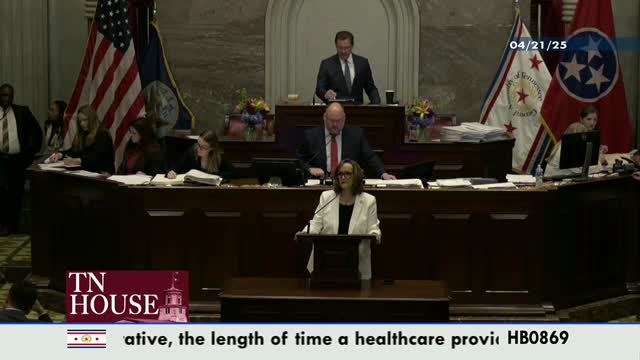House debate grows heated over proposed limit on public recording near police; amendment to remove 'halo' fails
Get AI-powered insights, summaries, and transcripts
Subscribe
Summary
A measure that would restrict how close members of the public or press can stand to certain police operations drew hours of floor debate and failed amendments; lawmakers split sharply over free-speech and public-safety arguments.
The Tennessee House engaged in an extended and highly charged debate over a provision in a substituted Senate bill (Senate Bill 30) that would restrict how close members of the public can approach or film police during certain operations.
The provision — described in debate as a “halo” or a 25-foot buffer around officers during specific incidents — drew criticism from Representatives who said it would criminalize bystanders and the press and undermine accountability. Representative Behn offered an amendment to remove the “halo” provision, arguing it would prevent the public and journalists from exercising constitutional rights while observing law-enforcement encounters.
Leader Larry Lambert (floor recognition in transcript) and supporters said the measure is intended to help law enforcement perform duties safely and to address concerns about obstructive behavior during incidents. Opponents warned the proposal would be used to intimidate witnesses and curtail documentation of police interactions.
Representative Behn, arguing for the amendment, said federal courts have repeatedly upheld the public’s right to film police and noted the George Floyd case as an example of the public’s role in documenting misconduct. "Not only would she [the person who filmed George Floyd] have been criminalized under this bill, she could have been retroactively jailed," Behn said, referencing the bystander who recorded the killing.
Several lawmakers delivered floor speeches opposing the halo provision and the broader bill. Representative Justin Jones of Davidson County accused the majority leadership of welcoming and enabling white-nationalist rallies and said this bill would not protect targeted communities from hate and intimidation. Representative Jones argued it would silence marginalized voices and impede accountability for misconduct.
Representative Lambert and supporters rejected those characterizations and defended the bill as a public-safety measure. The House voted down Representative Bang’s amendment to remove the halo provision; the clerk later recorded that the amendment failed. The chamber ultimately voted on the substituted Senate bill; the clerk reported the roll, and the bill did not receive the necessary constitutional majority in the moment recorded (the clerk declared the motion “pass by objection” where noted), reflecting a divided chamber.
The debate included multiple motions, a previous-question motion, and a series of procedural votes; civil-rights, press freedom and immigrant-advocacy groups (referred to by speakers during debate) were cited by opponents as opposing the provision.
Because the transcript records both the amendment attempts and the floor speeches, the House’s next steps will depend on whether the sponsor or leadership revises the language in conference with senators or returns the substitute to the Senate for further action.
